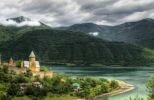People disagree on what is best for business or even how much business matters to an economy. The Soviet Union had an economy of sorts and didn't really have any legal business that was driven by market principals. In many parliaments and certainly in the US Congress there is disagreements about how to help the economy and how to promote business. A few years ago, United States Treasury Bills were downgraded in their ratings. Some members of Tea Party wing of the Republican Party had made statements that it wouldn't matter if the US defaulted on its debts. So the rating agencies downgraded what everybody had believed was the safest long term investment in the world and it became more expensive for the US to borrow. Since before it was completely clear what would happen with US Treasury Bills, then it became a little less certain, some people got nervous.
Nations, groups of people, families and individuals – all those categories have their own strong and weak points. The strong points are helping them to survive and the weak ones are in there way to success. Isn’t this patently obvious? So it is absolutely natural that we are all trying to develop our strong points and get rid of the weak ones if we have any. If otherwise, then we are certainly out of our mind.
Caucasian Pine largely known as Nordmann fir is the most popular Christmas tree in Europe. One Christmas tree is sold for at least EUR 30 at European market while licensees producing seeds of this fir tree in Georgia grudge GEL 2 to pay per kilo of cones to cone gatherers, who climb as high as 60 meters to get cones that produce seeds. Pricing, gathering and export of the cone-seeds look pretty strange in Georgia thanks to liberalized licensing policy introduced by Georgian authorities in 2009.
Legal reaction to the May 17 events and subsequent developments was insufficient, Thomas Hammerberg, the EU Special Advisor for Constitutional and Legal Reform and Human Rights, said at the presentation of the 40-page report at the Radisson Blue Iveria hotel.
Broadcaster?Political war on Public
The expression “He who rules Rome rules the world” is interpreted in Georgia as “He who rules ‘Public Broadcaster’ rules the public”. Elections are approaching and the political temperature goes higher. The hidden-up-till-now war to take hold of the Public channel has turned into a direct confrontation.
Maia Panjikidze, Minister of Foreign Affairs of Georgia, says that the Grigory Karasin’s assessment of the Ditsi and Dvani developments is wrong. Maia Panjikidze is convinced that there would have been an appropriate answer from EU’s special representative in South Ossetia Philip Lefort to this statement from Russia’s Foreign Minister on this topic.
The author of this article is a first-hand witness and participant of the exodus via Kodori that followed the Sokhumi’s capitulation. It was a hard journey via the mountain pass – “hard” because exhaustion disabled everyone from helping others.
Irakli Alasania, Georgia’s Defence Minister, break almost sensational news when he states that units of Georgian army would be a part of the rapid response forces of NATO from 2015.
Georgia hosted over three million tourists in the first eight months this year and expects five million by the end of this year. The tourist sector grew by 1% in the total GDP of the country, based on the two quarters’ statistics and Georgia was ranked as the top country with the fastest tourism inflow rate in Central and Eastern Europe in the six-month report of the World Tourism Organization for the year of 2013 in August.
The USD 350 million worth railway bypass project of the state-owned JSC Georgian Railway expected to re-route the railway track off the center of the Georgian capital to the outskirts is snagging over the feasibility study concluding that the bypass project falls far behind the expectations.





















































